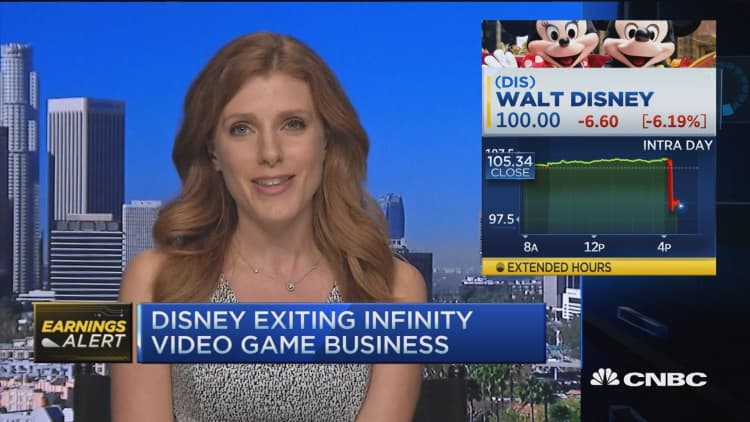Four months ago, Walt Disney boasted loudly about the strength of its self-published video game unit. Tuesday, the company shut it down.
The abrupt decision caught many in the industry off guard, especially given the company's announcement in December that its latest installment of "Disney Infinity" had quickly topped the $200 million sales mark and become the leader in the so-called toys-to-life category, surpassing Activision's "Skylanders" and Warner Bros.' "Lego Dimensions."
But in fact the writing has been on the wall for a while.
A month ago, Disney pledged to make "Disney Infinity 3.0" its "biggest game ever" via downloadable content. But the underlying message many walked away with was the company had decided not to make a new version of the game this year. The previous month, Disney had announced it would skip E3, the video game industry's annual trade show.

The toys-to-life business — a fusion of the video game and real-world toy markets — has been a boom area for publishers for the past five years. Activision kicked it off with "Skylanders" in 2011, which has since grown to a more than $3 billion franchise. In 2013, Disney brought its considerable stable of characters to the arena and made an impact. Last year, though, the field showed signs of retraction.
"Skylanders: SuperChargers" saw lower sales than its predecessor, and Activision has warned that it expects the numbers to be lower again with the 2016 installment of the series. And the category's diminishing returns seem to be the catalyst for Disney's decision.
"That business is a changing business, and we did not have enough confidence in the business in terms of it being stable enough to stay in it from a self-publishing perspective," said Robert Iger, Disney's chairman and CEO on an earnings call. "We knew going in that there would be a lot of risk with this product, and the fact that we did so well initially, gave us the confidence to continue with it. The truth of the matter is that the risk that we cited at the beginning when we went into this caught up with us."
Analysts put it a bit more succinctly.
"Now that the category is showing suspicious growth, I think they thought 'Hey, let's get out of here before it gets ugly,'" said Michael Hickey of The Benchmark Company.
Roughly 300 jobs will be impacted. While Disney will no longer make its own video games, it does plan to continue licensing its properties to other developers, much like its "Star Wars" licensing deal with Electronic Arts.
Tuesday's announcement is actually a familiar retreat for Disney. In 2011, the company laid off a significant portion of its game development team, saying it was walking away from console games to focus on mobile titles. That move, like this one, came on the heels of Disney proclaiming victory. In that case, "Epic Mickey" had just been declared one of the fastest-selling games in the company's history.
While Disney has had copious success in other entertainment fields, it has never been able to crack the gaming world. It has plenty of intellectual properties that are ripe for games (as EA has shown with "Star Wars Battlefront"). It has had some of the industry's top developers, including gaming legend Warren Spector, on staff. Yet it has never broken through as a top-of-field name in games.
"I think they've struggled to really find harmony and sales in video games," said Hickey. "Creating console games is fairly difficult and there's a level of expertise that has taken other publishers (like EA, Activision and Take-Two) multiple cycles to build."
People who have worked at the company also point privately to Disney's internal politics as an issue that held the video game business back. Stakeholders in various divisions have often been unwilling to trust game developers with the properties or characters and, in turn, have micromanaged the game-making process or insisted on last-minute changes, unaware of the time those demands required. That, in turn stretched development times (raising costs) and often resulted in a less-than-optimal title.
A Disney representative disputed those claims, pointing to the successful collaboration between the developers of "Disney Infinity" and the Walt Disney World, Marvel and Lucasfilm divisions as an example.



